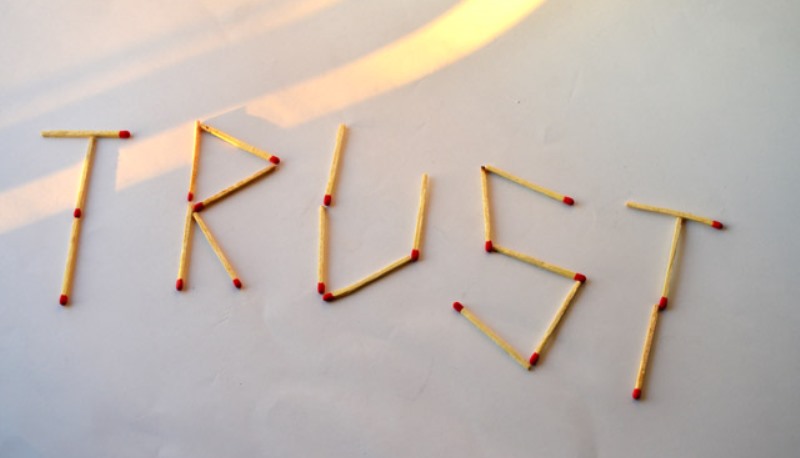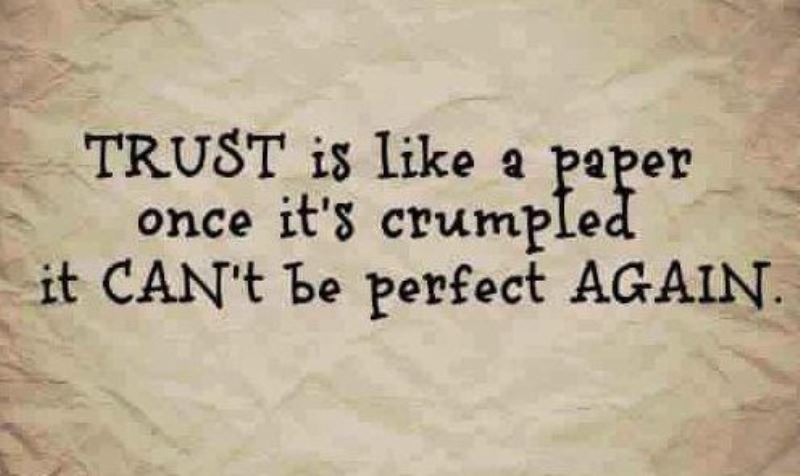We live in curious times. From Uber rides to Airbnb accommodations and Craigslist transactions to a Presidential candidate who reincarnated the end-justifies-the-means adage, we regularly dish out proof of out trust-investments in strangers but continue to remain sh*t scared of believing people we know. On one hand, we clamor for transparency, vouching for its legitimacy as the only tool for forging real, meaningful connections while on the other hand, we do not shy away from propounding distrust, doubt, hate and meanness behind anonymous Twitter handles, Facebook pages and mail. We are guilty of distorting our own relationships with truth to such an extent that we end up confusing ourselves, even in the face of reality. We question factual news ‘stories,’ wonder if pictures are tweaked and doubt if the best pieces we read online are plagiarized. Of course, there is room for ‘reasonable doubt’ in a world that is filled with scammers, liars, cheaters and manipulators but inviting doubt into our personal spaces can wreak havoc.

Image source: Google, copyright-free image under Creative Commons License
The lack of trust in our interpersonal relationships is no new phenomenon. However, the worst part is that our romantic relationships are no exceptions. How did we ever slip into such an abyss? Did we think we could ever achieve a truly intimate relationship with our partner when we didn’t know how to trust them? Did we think we could be in deep, intense romantic connections without acknowledging the ever-conspicuous lack of trust? What did we think could lay the foundation of our relationships? Where from did we derive these new (not to mention, ineffective and despicable) rules of trust?
Suggested read: 7 powerful trust-building exercises for couples
We need to recognize that in an age flustered by technological scams, we are compounding our own troubles by creating and building an environment in which trusting somebody seems naïve, gullible and foolhardy. Granted, very often it is– but many a times, it isn’t. And it is our duty to identify these spaces in which we can build trust to ensure we continue to live in a complex, changing world with constant connectivity without compromising on our connections. And it is our personal spaces that rule this list. We need to learn to trust people and the capacity to do so comes from within. We need to learn that our ability to trust is NOT contingent on external factors- as we often believe.
No betrayal should impair our ability to trust in another who may not turn out to be the cheating scumbag who broke your heart. No breach of trust should be allowed to damage your capacity to believe another who is willing to not only make the same promises, but displays the integrity to keep them. The rules of trust in romantic relationships are pretty simple. You build trust with your partner with the help of behaviors that affirm your honesty, integrity and dislike for leaving gaps for doubt. Of course, you expect the same from your partner- believing that they shall act in a manner that ousts all ambiguity and deception, and become comfortable with clean, honest conversation, leaving no room for secrets and lies in your relationship. However, real trust comes with an acceptance of the fact that you have no real control over your partner and their actions. You can only play your own cards in building trust with the other person- and the other half is a gamble you wouldn’t learn the outcome of, unless your partner folds or shows!
If you can understand this crucial prologue to the rules of trust building in relationships, you are ready for your main lesson. Here are the ONLY rules you will ever need for creating, building and sustaining trust in relationships:
1. Be honest

Image source: Google, copyright-free image under Creative Commons License
This isn’t really a revelation. For a long time, I have reiterated the necessity of being honest, transparent and completely truthful with your partner. Lies only serve to distort your partner’s perception of reality and increase distrust and deception that are likely to create more distance between you. The reason trust is a difficult thing to achieve is because people are unable to let go of their own distrust from their past, beliefs, misgivings and/or other deceptions. By doing the same in your relationship, you are making them more guarded and setting up an impediment to achieving true, open intimacy and closeness.
Encourage open, candid conversations that can help establish trust in your relationship, by breaking through these inherent defenses and giving people a reason they need to be more freely ‘giving’ of their trust. I have said that the process does require one to be ‘trusting’ from within- but facilitating the process can make it easier, quicker and effective. I have often herd of people guarding the truth or keeping their partners from it because ‘they don’t want to hurt them’- however, being genuine and forthright is the only real option in relationships. Don’t allow for ambiguity, doubt or suspicion to slip into the deception realm- or else the breach shall be too darned impossible to recover from.
Suggested read: 5 compelling reasons why trust in a relationship once lost is hard to regain
2. Set your standards, irrespective and independent of/from your partner
When you generate your own standards for your behavior, separate from, your partner, you are setting the tone of your relationship for even the most challenging times. For instance, if a bad day at work doesn’t get you to take it out on your partner- you display a strong sense of consistency in your behavior that might get your partner to draw out the same levels of consistency in their own behavior. If you remain erratic, suspicious and dishonest, you may feed the same elements into your relationship. So, remain open, flexible, honest, sincere and reliable and you’d bolster the chances of getting the same from a trustworthy partner.
3. Avoid making unrealistic rules

Image source: Flickr
When you are doubtful of your partner, you tend to set arbitrary rules for behavior that may curb the life-spirit or freedom of another individual. This may, in turn, breed resentment that may prove to be lethal for your relationship. Before setting flimsy restrictive rules in place (that are a consequence of your own mistrust), sit and introspect. Identify if you are punishing your partner for your own misgivings- and if you are, then work through your own doubts instead of trying to solve your issues through an external mechanism. Emotional manipulation, restrictive rules or guilt-inducing threats may only cost your relationship in the long run. Do not strip your relationship of its natural warmth by pushing your partner to start lying or hiding those aspects of his/her life that get you riled up, owing to your own misgivings.
4. Avoid the halo effect
The Oxford English Dictionary defines the halo effect as “the tendency of a favorable (or unfavorable) impression created by an individual in one area to influence one’s judgment of him or her in another.” Be wary of handing out trust passes owing to the same. Of course, we said that you must work hard to incorporate trust in your romantic relationships and sustain it. But remember to be cautious and on the lookout for any signs that may caution you to heed your better judgment. Just because your partner is friendly with everyone around doesn’t mean that his recent on-the-rise conversations with an ex isn’t a cause for concern. Do not jump ship, though or draw hasty conclusions- but speak your mind, express your qualms and iron out the creases through honest conversation.
5. Avoid blanketing trust

Image source: Pinterest
You cannot trust your partner simply because he has displayed ‘trustworthy’ behavior in one situation and therefore, another alarming one doesn’t warrant you looking into it. You are in a relationship and have the right to know what’s going on. So, if you ever feel like the danger alarms are going off, feel free- because trust isn’t about freely giving or withholding it based on an event or an outcome- it is about individuals. And individuals aren’t a function of their track records- you need to allow the actions to speak.
Suggested read: 8 definite signs to help you figure out if you’re dating a cheater
6. Focus on actions- they speak louder than words
As already mentioned, allow for individual actions to speak up about the integrity of the individual. If your partner says one thing and does another, you have all the reason to doubt them. Consistency in aligning one’s words and actions is important to establishing trust. You cannot trust a partner whose words and actions are repeatedly misaligned.
Remember that the word ‘trust’ comes loaded with emotional risk, impact and influence. You need to own your own part in creating the same as well as be mindful of what you are getting served.
Do you have your own handbook on the rules of trust in relationships? We’d love to know about it. Give us an excerpt in the comments below.
Featured image source: Google, copyright-free image under Creative Commons License












